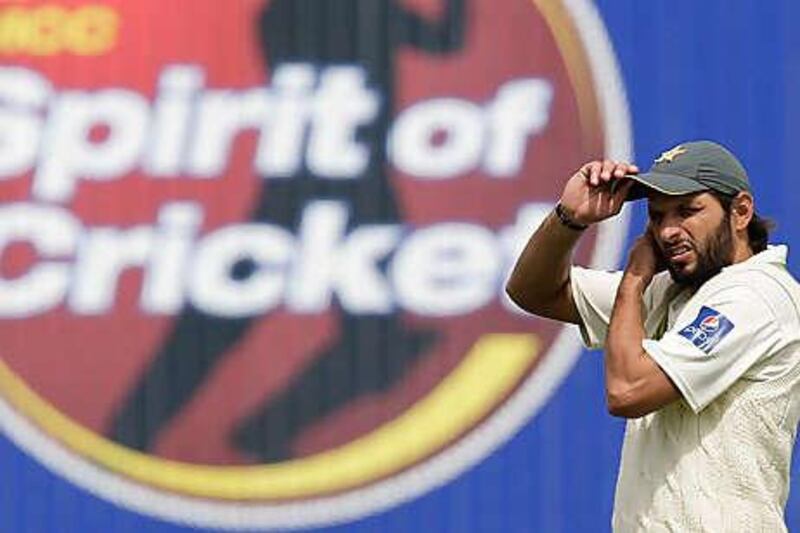His citing lack of ability as reason to quit Test cricket holds little water; quite simply his motivation lies elsewhere. Harold Wilson's dictum that "a week is a long time in politics" might as well have been uttered about Pakistani cricket. In the course of less than seven days, Shahid Afridi went from being that rare thing, a triumphant and universally acclaimed Pakistan captain, to leading his team to a humiliating defeat amid allegations of ineptitude and under-performance directed at him. 'Former captain' status quickly followed, and Salman Butt became Pakistan's fifth Test captain in just 18 months when led out the team against Australia at Headingley yesterday.
Lest we forget, Afridi was the captain who earlier just this month ended Pakistan's losing streak against Australia in all formats of the game, winning both Twenty20s against a formidable foe with his country's customary style, panache and exuberance. A week later, on his return to Test cricket after a four-year hiatus, and at his very first outing as Test captain at Lord's, he ended up as a former captain who resigned after another ignominious Test defeat, and more relevantly, an irresponsible and ambivalent personal performance.
The 150-run loss to Australia prompted Afridi to announce his retirement from the game's premier form, not for the first time but given the finality of his words and his age, probably for the last time. In a brazen press conference at Lord's on Friday evening, Afridi cited his unsuitability for Test cricket, and his complete inability to bat as required by the situation, as his reasons to retire from Tests.
A remarkable admission, but a palpably false one too; many of Afridi's best T20 and one-day international (ODI) innings, including the two which helped Pakistan win the T20 World Cup in 2009, and his two accomplished ODI hundreds as captain just last month in the Asia Cup in Sri Lanka, were calculated, sensible and mature. Hence, when it comes to Afridi playing sensibly in Tests, it is less a question of "can't" and more one of "won't".
This is also borne out by Afridi's performances when he used to play Test cricket over four years ago; for instance, in March 2005, Afridi was part of the Inzamam-ul-Haq led team that drew a tough away Test series in India; by no means an easy tour. Not only did Afridi top the Pakistan bowling average in that series (eight wickets at just 21 in his two Tests), he also contributed with the bat, scoring two quick-fire and invaluable 50s in the two Tests.
To top it all, he took the most prized wicket for any team touring India, that of Sachin Tendulkar, in three of the four innings he bowled in. So the promise and the potential definitely was there, but as with so much else in Pakistan cricket, this remains a story of unfulfilled potential. He leaves the Test arena with a record that is impressive for someone who, in the end, played with such apathy. A batting average (36.51) higher than a bowling average (35.60) places him in the high-class all-rounder category. It is a superior record than that of Andrew Flintoff, the lauded England all-rounder. It makes one wonder what Afridi could have achieved had he been motivated.
In any case, numbers never tell the full Afridi story - it was never about statistics or results for him. It was about his sheer force of personality, and the triumph of the individual over the collective. Witness an Afridi celebration, with its outstretched arms, the photogenic smile and the attention-seeking pose; all underlining the fact that, for this cricketer at least, team awards and results are secondary to personal glory and acclaim.
First and foremost, the phenomenon that is Afridi is then about entertainment; when he gets out, stadiums empty soon after, not just in Pakistan but here in the UAE too. Had he not been a cricketer, he might have had a long and fruitful career as the charismatic and likeable joker in one of the many low-budget and low-quality 'comedy' movies churned out by the Pakistani film industry. Even his farewell press conference was an exercise in self-aggrandisement. Described by those present as "dynamite", it was very unusual in this era of scripted responses to see such openness, but also a trifle unnerving to see how relaxed a happy and smiling Afridi seemed. This was not the demeanour of a man whose team had just been thrashed.
Given the unconvincing reasons for retirement, it is unfortunate timing and Afridi's apparent delight at abandoning his team, the suspicion lingers that there is more to this than meets the eye, as is normally the case with cricket in Pakistan. So what next for Afridi? The only thing that can be said with any certainty is to expect the unexpected. He remains the Pakistan one-day and T20 captain, for now. He will continue to exasperate, infuriate and dazzle us from beyond his Test cricketing grave. And, of course, his Test retirement opens up his own calendar for lucrative advertisements and financially rewarding T20 domestic leagues around the world.
And for Pakistan? The 25-year-old Butt takes over as one of Pakistan's youngest Test captains, and in far from ideal circumstances and from a predecessor who did not do him any favours. Butt is fortunate to have Waqar Younis with him as the head coach; Waqar could provide first-hand insight from his own disastrous first stint as captain after being appointed in 1993 as a 24-year-old. It would thus be naive to imagine that with Butt's appointment Pakistan have turned a corner; one fears that a whole different can of worms has been opened and the merry-go-round of Pakistani captaincy shall continue.
sports@thenational.ae Yasser Alvi is a writer at PakPassion.net





